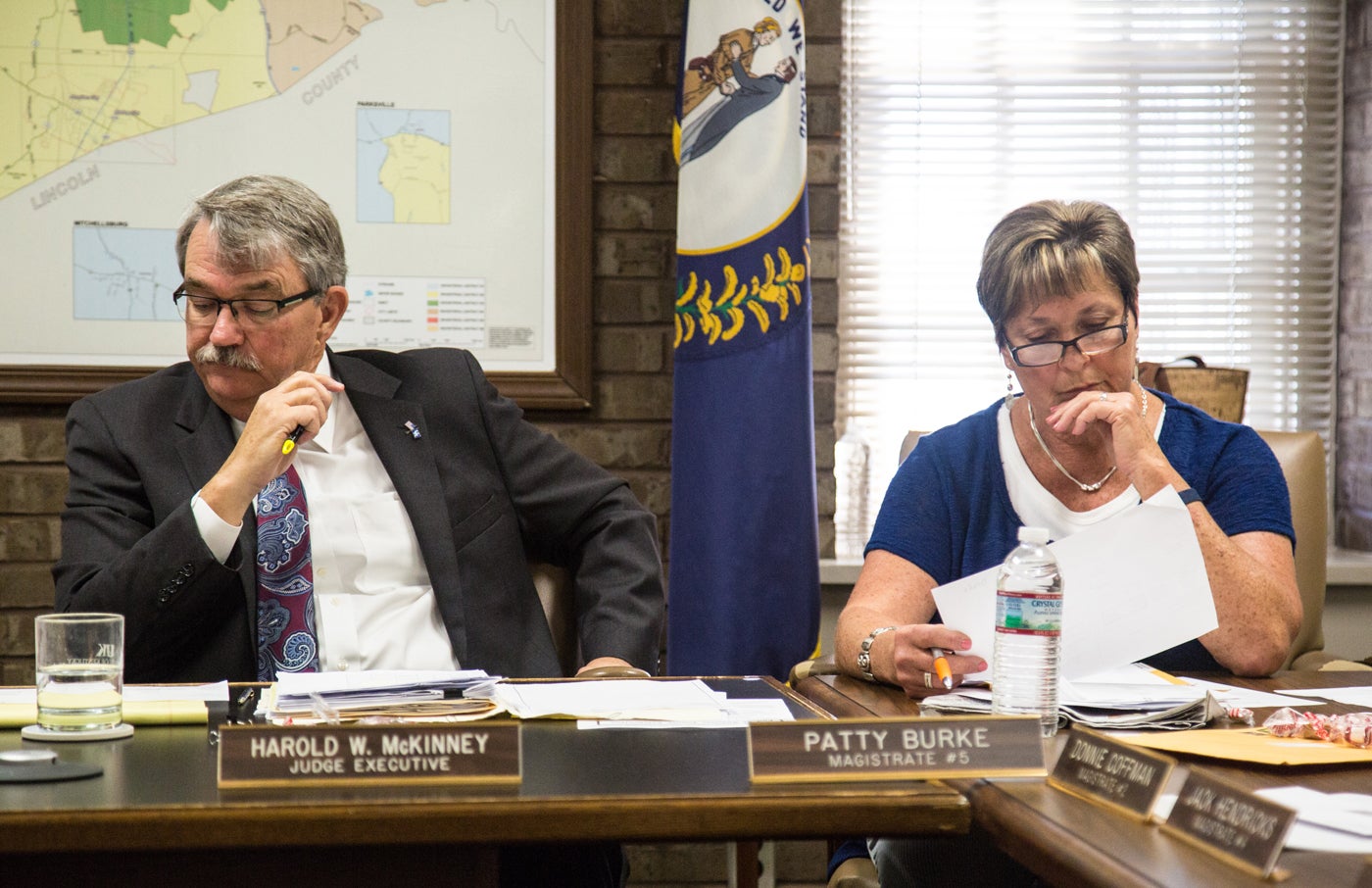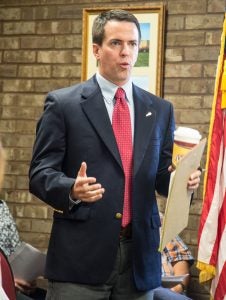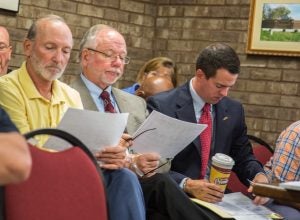Boyle Fiscal Court affirms plan to move 911 service to Garrard
Published 8:21 am Wednesday, August 30, 2017

- Ben Kleppinger/ben.kleppinger@amnews.com Boyle County Judge-Executive Harold McKinney, left, and Boyle County Magistrate Patty Burke participate in Tuesday’s special called meeting.
Boyle County Fiscal Court voted 5-2 in an unexpected move Tuesday morning to formally pursue a dispatch merger with Bluegrass 911 in Garrard County. In order to do that and gain a $200,000 grant, the court wants to eliminate the Danville/Boyle County “public service answering point” (PSAP) license — a plan Danville officials say will never fly.
Currently, 911 dispatch services for all of Boyle County, including the three incorporated cities of Danville, Junction City and Perryville, are handled by the call center owned and operated by the City of Danville along Hustonville Road.
But Judge-Executive Harold McKinney’s motion Tuesday at the end of a two-hour special called meeting on 911 services is the clearest indicator yet that a split could be imminent. If Boyle County does move forward with its plan, 911 calls made from unincorporated portions of Boyle County would be routed to the Bluegrass 911 dispatch center in Garrard County, which currently serves Garrard and Lincoln counties. According to Boyle County officials, it’s possible Junction City and Perryville could also move to Bluegrass 911, though whether that is likely to actually happen was unclear Tuesday.
McKinney typed up his motion before the meeting and passed it out to magistrates before officially making it.
“I move this court to clearly state our intent to join with Bluegrass 911 for all dispatch services for which the Boyle Fiscal Court is responsible and direct the county judge-executive and any other staff he deems necessary to begin the process immediately to accomplish that end,” the motion reads. “… I further move the court to combine the license for the public service answering point, commonly called the PSAP, with Bluegrass 911 and direct the county judge-executive to take whatever steps may be necessary to accomplish the same.”
Combining the PSAP licenses would qualify Bluegrass 911 to receive a $200,000 grant from the state that would cover all the costs of upgrading and reorganizing to handle Boyle County calls, Boyle officials said.
But there is disagreement between Boyle and Danville officials over who owns the PSAP license and whether Boyle County could act unilaterally to eliminate it. The license currently allows the operation of Danville’s 911 dispatch center; city officials say they have no intention of closing the center nor moving to Garrard County with the fiscal court.

Ben Kleppinger/ben.kleppinger@amnews.com
Danville City Attorney Stephen Dexter makes the case that an even three-way split of the cost to operate a regional 911 call center would be unconstitutional.
“The county lacks authority to transfer that (PSAP license),” City Attorney Stephen Dexter said. “This is not a combination of a PSAP, this is Boyle County deciding to utilize services from Bluegrass 911. There is no transfer of a public service answering point. They are seeking to utilize services elsewhere, which is their prerogative. The PSAP will remain with the City of Danville, as it has been certified for decades.”
Dexter said he believes the county’s attempt to do away with the local PSAP license will fail.
“We anticipate that the state would not approve transfer because that’s not in fact what it is,” he said.
Danville City Manager Ron Scott did not mince words on his opinion of the motion.
“It defies logic to think that the PSAP is owned and operated by Boyle County when for many, many years, the city and its taxpayers have funded the largest portion of the operating costs and owns the facility, hires and supervises the employees,” Scott said after the meeting. “The allegation that it is owned by Boyle County is a great leap of the imagination.”

Ben Kleppinger/ben.kleppinger@amnews.com
From left, Danville City Commissioner Rick Serres, Danville City Manager Ron Scott and Danville City Attorney Stephen Dexter review documents passed out at the Boyle County Fiscal Court’s special called meeting to discuss 911 dispatch Tuesday morning.
The fiscal courtroom was standing room only for Tuesday morning’s meeting, with numerous local officials and first responders filling every available seat and then some.
Boyle County Sheriff Derek Robbins shared a pair of complaints about the current 911 setup with those gathered:
1) Danville does not currently include the sheriff’s office or other first-responder agencies in the governance of the 911 center’s standard operating procedures, and so the sheriff’s office has no say in how calls are dispatched in different situations.
2) Danville also doesn’t include others in governance of the 911 center’s finances, which means, for example, that Robbins was unable to anticipate Danville’s planned 911 equipment upgrade planned for later this year when the sheriff’s budget was assembled six months ago.
Danville City Commission officials who attended the meeting seemed receptive to Robbins’ concerns.
“I’ve heard some good things this morning pointing towards the need for greater cooperation and communication for continuous improvement of our 911 system here,” Scott said later in the meeting when he addressed the fiscal court. “I think those are great ideas and we can work towards those.”
Scott said a service agreement between the city and county, which Dexter prepared a draft version of and distributed to magistrates prior to Tuesday’s meeting, would be a good way to put in place better communication.
“We need to get greater involvement to discuss any operational issues and budgetary planning issues. And I get that, and I think those are all valid points,” he said.
Later in the meeting, just before McKinney presented his motion, Danville City Commissioner J.H. Atkins said he had never previously heard complaints about groups involved with emergency services wanting a “seat at the table” when it comes to managing the 911 center.
“If you’ve got all these issues about not having a voice at the table involving first responders, it’s the first time some of us have heard about it,” Atkins said. “… We need to meet and have some of these issues discussed before we have major concerns about them. It’s sad to sit around this little bitty room and have all this expert knowledge sitting here and you hear people talking about, ‘I don’t have a place at the table.’ Well excuse me, you live in Danville and Boyle County; you are entitled to a place at the table.”
City officials were more critical of financial estimates from Boyle County Treasurer Mary Conley, who attempted to compare the cost of continuing to use Danville’s call center to the cost of switching to Bluegrass 911.
According to the documents passed out by Conley at the meeting, the budget for the Danville center in 2017-18 is estimated at almost $1.2 million. After subtracting 911 revenues from landline telephones and cell phone fees, Conley listed a liability of about $987,000 that has to be paid by Danville, Boyle County, Junction City and Perryville.
Breaking that amount down based on the populations of the cities and giving Boyle County the population of only its unincorporated portions, Conley estimated Danville will pay almost $563,000 (57 percent); Boyle County will pay almost $326,000 (33 percent); and Junction City and Perryville will pay almost $99,000 (10 percent).
Conley also included figures for a budget that was $300,000 larger in order to account for funding “emergency medical dispatch services.” But Danville officials said EMD costs were already baked in to the $1.2 million budget Conley started with.
Conley compared those expenses to how much it is estimated to cost if everyone moves to Bluegrass 911.
In theory, Bluegrass 911 would have a total budget of about $1.37 million. That cost would be split three ways equally between Garrard, Lincoln and Boyle counties, meaning each county would owe about $458,000, according to Conley. After subtracting cell phone and landline revenues and dividing based on population again, Conley came up with the following estimated costs: about $144,000 for Danville, almost $84,000 for Boyle County; and about $25,000 for Junction City and Perryville.
Conley also provided a rough estimate for a cost to Boyle County if Danville did not also move to Bluegrass 911 of about $413,000. If Boyle County then raised its landline fee from 50 cents per month to $3 per month, Boyle County’s general fund cost would drop to about $188,000, according to Conley’s estimates. A monthly landline fee of $5 would essentially eliminate the general fund expense, leaving just $8,365, according to Conley.
Conley’s estimate of about $413,000 in cost for Boyle’s general fund if the landline fee remains unchanged is more than the approximately $326,000 she estimated for remaining with Danville and the $1.2 million budget. The estimates for transferring without Danville do not include any 911 revenue from cell phones.
Scott and Dexter said splitting the cost for operating Bluegrass 911 equally three ways could potentially violate the Kentucky Constitution.
Dexter said the Constitution requires that taxpayer funds be spent on services in the jurisdiction where the funds were collected. That means Boyle County taxes can’t be spent to provide services in Garrard County and vice versa.
“You can divide things accordingly based on use of service, but it has to be exact,” Dexter said.
An equal three-way split of the cost could in theory mean Lincoln and Garrard would be paying more than their fair shares of the cost, since Boyle would have the largest call volumes, Dexter said.
“It would be inequitable and unconstitutional to split those a third, a third, a third between your partners,” he said. “Citizens of Lincoln and Garrard County could not underwrite one-third of any deficiencies from that center — that’s what would be unconstitutional, because Boyle County would have to pay their share.”
Scott called the estimate of about $1.37 million for Bluegrass 911’s budget is a “gross estimation.”
“Given the call volume that exists in Danville-Boyle County, there is no way that Bluegrass 911 can absorb that without increasing costs more dramatically than I think (is) presented,” Scott said. “Irrespective of what the total cost is, it’s in my opinion grossly over-simplistic to think that it’s legal to share those costs a third, a third, a third on a county basis, given the constitutional provisions that taxes raised locally must be spent locally.
“To think that some other county is going to subsidize the higher workload of Danville-Boyle County is just begging for the lawsuit to be filed and the subsequent correction to be made in terms of what we all pay.”
Boyle County Attorney Lynne Dean said constitutional requirements could be “kept in mind” and there could be appropriate oversight to make sure money is spent appropriately in a merged 911 center.
Also speaking at the meeting:
• Paramedic Mike Rogers made the case for implementing emergency medical dispatch services quickly. When EMD is available, dispatchers can give callers instructions on how to provide medical assistance to people having a medical emergency. Adding EMD, which Danville does not currently offer, would greatly improve the county’s survival rate for out-of-hospital cardiac arrests, Rogers said.
• Danville Mayor Mike Perros said Danville’s 911 center has excellent staff and the city intends to keep its call center and the staff. “We are very concerned about creating jobs in this community,” Perros said. “We certainly don’t want to lose any jobs in this community.”
• Dr. Eric Guerrant, head of the emergency room at Ephraim McDowell Regional Medical Center, said he wants to see EMD implemented as soon as possible and moving to Bluegrass 911 would allow that to happen. As a civilian, he said he also sees benefits to regionalizing 911 service in terms of cost savings and additional inter-agency cooperation and communication.
• Anthony Young with the Perryville Fire Department said he doubts how well radio communications would function between Bluegrass 911 in Garrard County and remote, western areas of Boyle County. In some regions in Perryville, it’s already difficult to get a good connection with the Danville center, he said.
The last person Judge-Executive McKinney called on to speak was Boyle County Emergency Management Director Mike Wilder.
Wilder said he is in a “unique position” because he is funded by both Danville and Boyle County, so he works for both governments.
“Whatever decision is made, I will be glad to abide by that in any shape, form or fashion that is asked of me,” Wilder said.
Wilder said based on “facts and figures” presented by McKinney and Conley and the lack of an interlocal agreement on 911, “it’s my recommendation that the City of Danville and Boyle County Fiscal Court enter into serious negotiations with Bluegrass 911.”
“I think we’re at the point in time that I really feel that that’s what we need to do,” he said. “Both entities — not one, but both entities need to do that.”
Magistrate John Caywood questioned Wilder about where officials would be located as they tried to handle a hypothetical disaster under a scenario where Boyle split from Danville for 911 service. Wilder and then McKinney confirmed for Caywood they would both work out of a local emergency operations center (EOC) that would likely be based in the Boyle County Fire Department. Danville Mayor Perros told Caywood he would be at the existing PSAP, meaning Danville’s 911 call center.
Caywood said he didn’t like the idea that in a disaster, the dispatchers would be located in Garrard County, the Boyle County officials would be located at their EOC, and the Danville officials in yet a third location.
“I’m struggling with command — I’ll be very honest with you,” Caywood said. “I’m struggling very hard with that, because the command is what affects the end result of how you take your assets and use them to the best you can. And in my mind, in my experience, command has to be together. Otherwise, our assets are not really being used to the maximum of their ability.
“… I’m very much for the command decisions being made together, and not separated.”
Wilder said most EOCs don’t operate out of a dispatch center and his recommendation is based on everyone going to Bluegrass 911 together.
When McKinney made his motion at the end of the meeting to formally pursue a merger with Bluegrass 911, Magistrate Jack Hendricks seconded the motion “in order to get discussion going.”
Magistrate Patty Burke said she did not come to the meeting planning to vote on anything.
“I came to listen, to hear. And I still have some questions,” Burke said.
Caywood said “I’m sorry that I’m just now seeing this,” referring to the typed out motion.
“Well, it’s a motion, John,” McKinney said.
“I understand it’s a motion, but it’s a motion that you have written before and we had no awareness that this was going to be asked,” Caywood said.
“I wrote the motion this morning so that it would be clear, rather than making it and (it be) unclear,” McKinney said.
“When you call for a vote, I’ll be glad to let you know how I feel,” Caywood said.
“I don’t doubt that,” McKinney said. “I wrote the motion out because everybody needs to understand what the motion is.”
McKinney called for a roll call vote on the motion. Magistrate Phil Sammons, Magistrate Dickie Mayes, Hendricks and Magistrate Donnie Coffman voted in favor. Caywood and Burke voted against. McKinney also voted in favor, making the final count 5-2.
After the meeting, Caywood said McKinney’s motion was “out of line.” The meeting had been presented as an informational one — there was nothing on the agenda indicating a vote would be held, he said. And there were too many questions remaining unanswered, he added.
Given time, the county could pursue revisions to the proposed service agreement with Danville, Caywood said.
“I feel that the final product had not yet been completed and could have been negotiated and the citizens would have been the winners,” he said. “Most of my district, the sixth district, is in the city, and therefore, I’m very concerned about them and I want to do what is best and serves their purposes, because they pay tax dollars.
“It was way too early to be forced to make a decision.”






